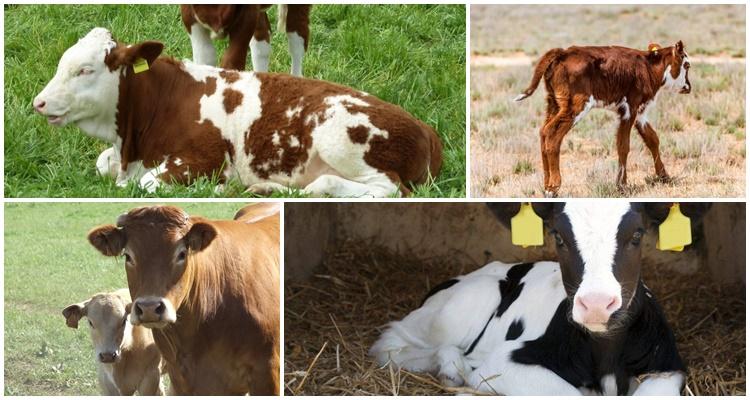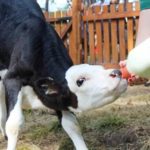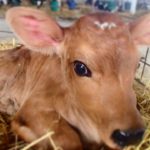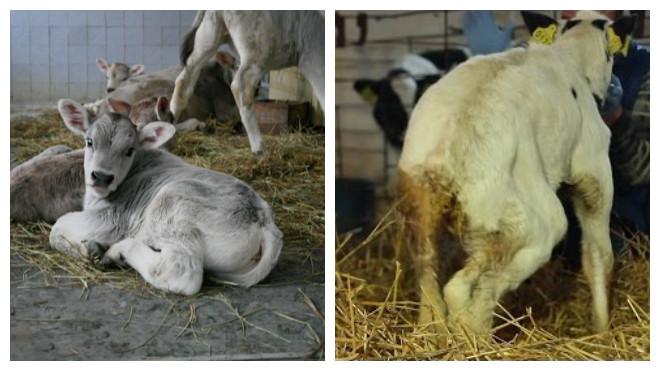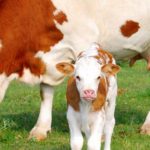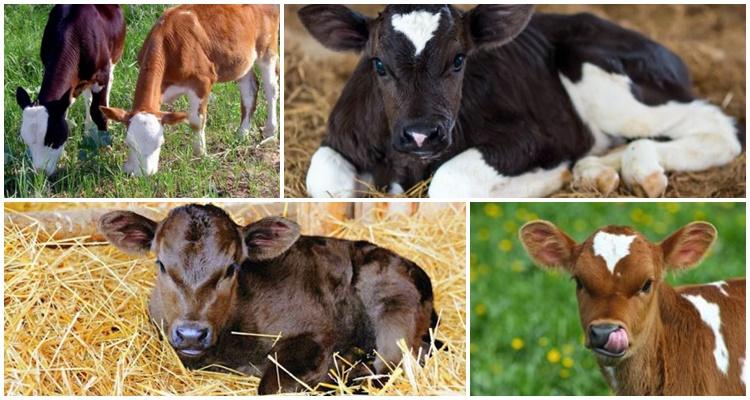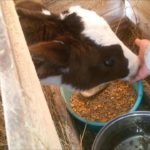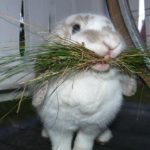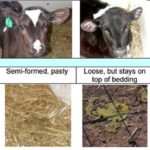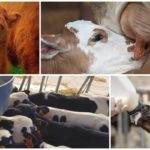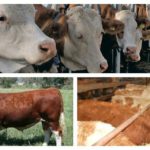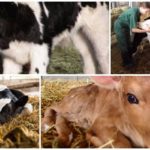Digestive disorders are common problems in ruminant pets. This is especially true for young animals. This happens because the food system of small calves is not yet well developed and cannot yet cope with adult food. Let's consider what to do if a calf has constipation, its causes, characteristic symptoms, how to diagnose and treat it with drugs and folk methods.
Causes of constipation in cattle
Constipation in a newborn occurs because he does not drink colostrum or drinks it later than necessary.Colostrum contains substances necessary to activate and normalize digestion and strengthen the immune system. Among them are acids that stop the development of pathogenic microorganisms in the gastrointestinal tract of calves.
The calf then switches to milk. If he is raised without a cow, constipation can occur due to non-compliance with the feeding scheme, when overfeeding with milk, if it is cold or too warm, or sour. All such cases are the result of the animal owner’s inattention.
But much more often the cause is an infection that enters the baby’s body from the outside if the cleanliness of the bedding, inventory and equipment in the barn is not maintained. Constipation can be caused by helminths that live and reproduce in the intestines of calves.
Symptoms and signs in cows and calves
Retention of feces in a calf for more than a day is an alarming symptom. Prolonged failure to remove waste products leads to intoxication of the body, and may even result in the death of the animal. The first signs of constipation in cows can be seen a day after the disorder. Before this, the animal does not yet experience severe discomfort and reacts little to what happens in its body.
Since the intestine is clogged and there is no way out of feces, the calf feels discomfort, its abdomen swells a little, becomes dense, and bowel movements are rare or absent. The animal is depressed, lies down a lot, moos when trying to defecate, and its temperature rises. But the main sign of constipation is hard stool or its absence due to a stop in the movement of intestinal contents. A deficiency of fiber and especially water also serves as a prerequisite for its appearance.
In this case, the feces are dry and cannot move through the intestines due to poor motility.
Constipation can develop from blockage of the book with food lumps and their drying out between the leaves of the organ. The loss of feed occurs due to prolonged feeding of cattle with roughage, grazing on poor pastures, and eating dirty or too finely chopped root crops. Blockage of the digestive tract occurs due to atony of the proventriculus, poisoning, and infectious diseases.
Diagnosis of the problem
Despite obvious signs of a problem, the diagnosis and its cause must be determined by a veterinarian. He will need information about what the calf ate before the problem appeared, how it behaved, and whether it was active.
At home, a preliminary diagnosis can be made by characteristic signs, palpation of the abdomen, if it is dense, slightly swollen, and the animal is uncomfortable when touched, it tries to escape, kicks, moos, then it could be constipation.
The blockage can also be identified during a rectal examination - a plug of hard feces will be visible in the rectum.
How to treat constipation
Treatment depends on the severity of constipation and its duration. You can fight it with folk remedies if constipation is mild, or give the calf special laxatives if they are ineffective.
Drugs
Among medicinal antibacterial drugs, the calf can be given “Sintomycin”, “Norsulfazol”, “Levomycetin”, “Fthalazol”. Laxatives are sold in powdered form or in tablets. It is not difficult to make a medicine for cattle from them at home; you need to dilute a certain amount of the product with water.
The dosage of the drugs must be strictly according to the instructions and also given in the volume indicated therein, since improper treatment can easily lead to the opposite effect. Give laxatives 0.5 hours before meals 3-4 times a day. If the bloating is severe, doctors advise rubbing the animal’s belly with turpentine diluted with water to enhance its work.
Traditional methods
As soon as constipation is detected, you need to stop giving your baby milk. It is processed in the stomach with the formation of gases, which only worsens the situation. In order for the calf to defecate, it is given castor or vegetable oil (100-150 ml each), and a decoction of flaxseeds.
He is given an enema with warm, soapy water. After this, the calf’s stomach is massaged to start digestive processes and intestinal motility. Movements should be soft, smooth; you should not press hard or sharply on the stomach. The calf is massaged in a standing position; if it lies down, there will be no effect. Instead of a massage, you can simply take the calf out into the yard and force it to move for at least 0.5 hours at a time. Movement stimulates the work of the stomach and intestines. If these methods do not produce results, you must contact your veterinarian, who will select the solution necessary for each case.
Preventive measures
Prevention of constipation in cattle should begin when the cow is pregnant. She needs to be fed well, because a calf is developing inside her, which takes in a huge amount of nutrients. Remove the litter as soon as it becomes dirty. Do not put old moldy straw or hay as bedding, as animals will eat them from the floor.
To prevent constipation in a newborn, you need to leave him with his mother so that he drinks colostrum. Make sure that calves do not drink more milk than necessary.A hungry baby can drink more milk at a time than usual, but instead of remaining in the stomach, it will spill into the rumen, where it will sour, since there are no bacteria there yet to process it. Therefore, you need to calculate how much food the calf needs, how often to feed it milk and feed it according to the schedule. The same applies to feeding on formula milk.
It is important to monitor the psychological state of the baby. If you need to separate it from its mother, then this should not be done abruptly, but gradually, so that the calf can get used to the new conditions. Otherwise, in nervous individuals, stress affects the functioning of the entire body, and in particular the digestive system.
Feed new foods gradually so that the stomach can get used to unfamiliar food; cut root vegetables and vegetables into pieces so that the calf can swallow them. In the fall, when frosts begin, make sure that cows and calves do not eat frozen grass or grass that is wet from dew or rain.
To prevent intestinal blockage with feces, immediately after birth, the calf is given yogurt containing acidophilus bacteria in the amount of 1 cup.
To prevent constipation from developing in calves from an infectious disease, you need to promptly remove the bedding in the barn and lay a new one. Wash and disinfect equipment and utensils. Disinfect the premises 2 times a year. Disinfection of materials is the best way to avoid infectious diseases in livestock.
Feed, especially small calves, a feed with a balanced composition so that all the nutritional components enter their body in the quantities they need. The diet should include grass and hay, root vegetables, vegetables, and mixed feed. Be sure to give a lot of water, as much as the calf can drink.We need to let him out with the cow for a walk every day. Movement has a beneficial effect on intestinal motility and forces the contents to move towards the exit.
Constipation in a calf means that there is a digestive disorder, which is a symptom of certain diseases, poisoning, overfeeding, and improper feeding. In most cases, constipation does not go away on its own; the calf needs help to get rid of the problem. The livestock breeder has at his disposal effective folk methods and traditional veterinary medicines. As a rule, when used correctly, the treatment gives a good result, the calves' digestion is normalized, and they feel much better.

